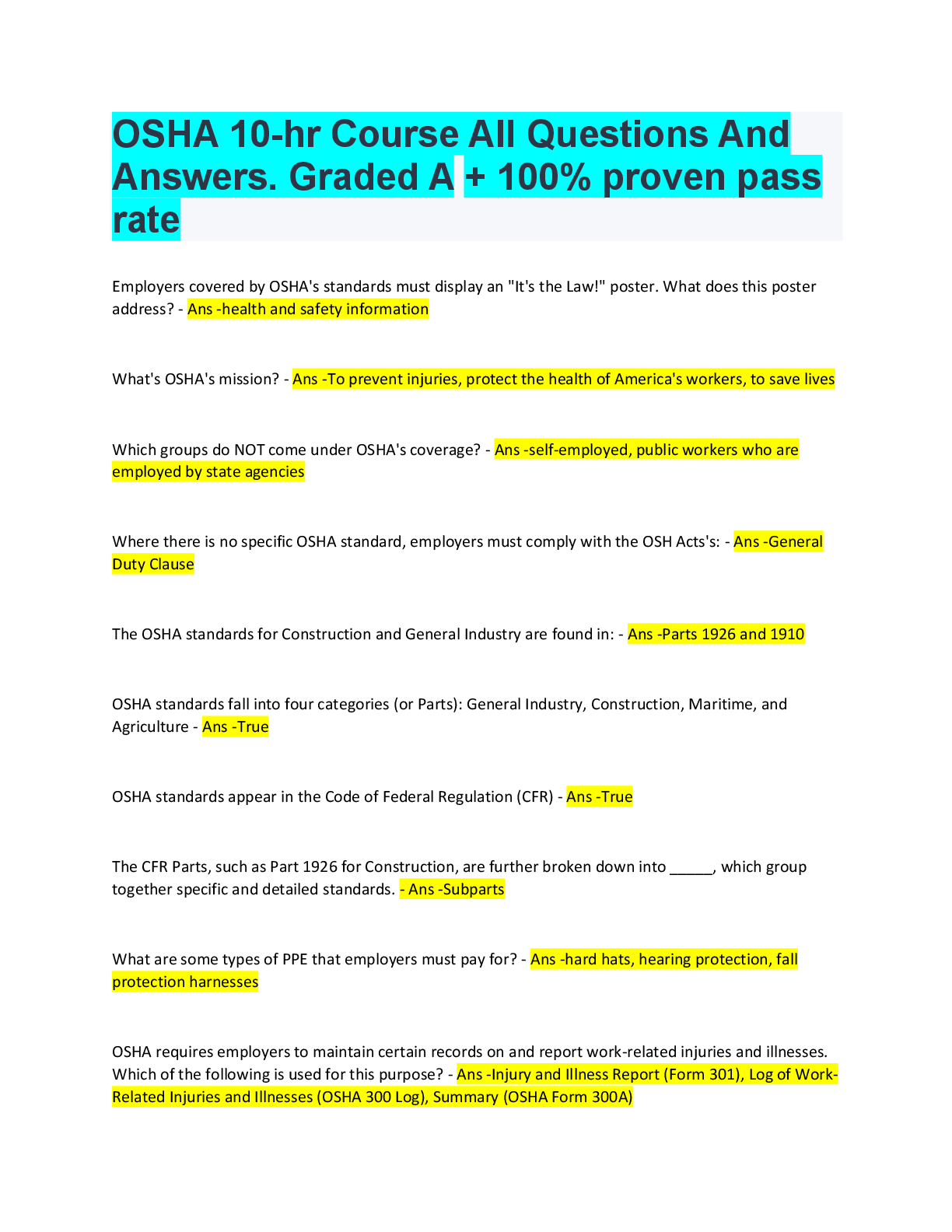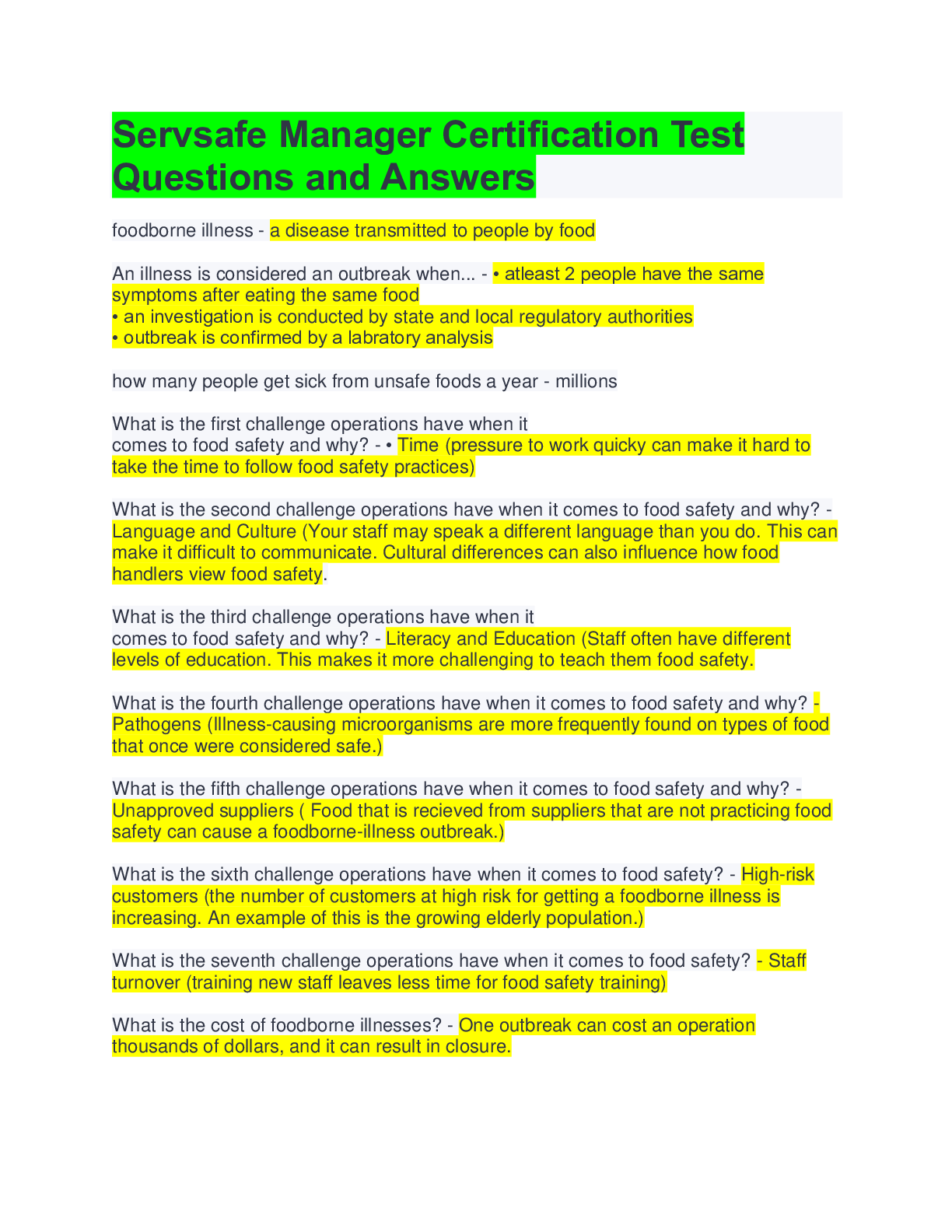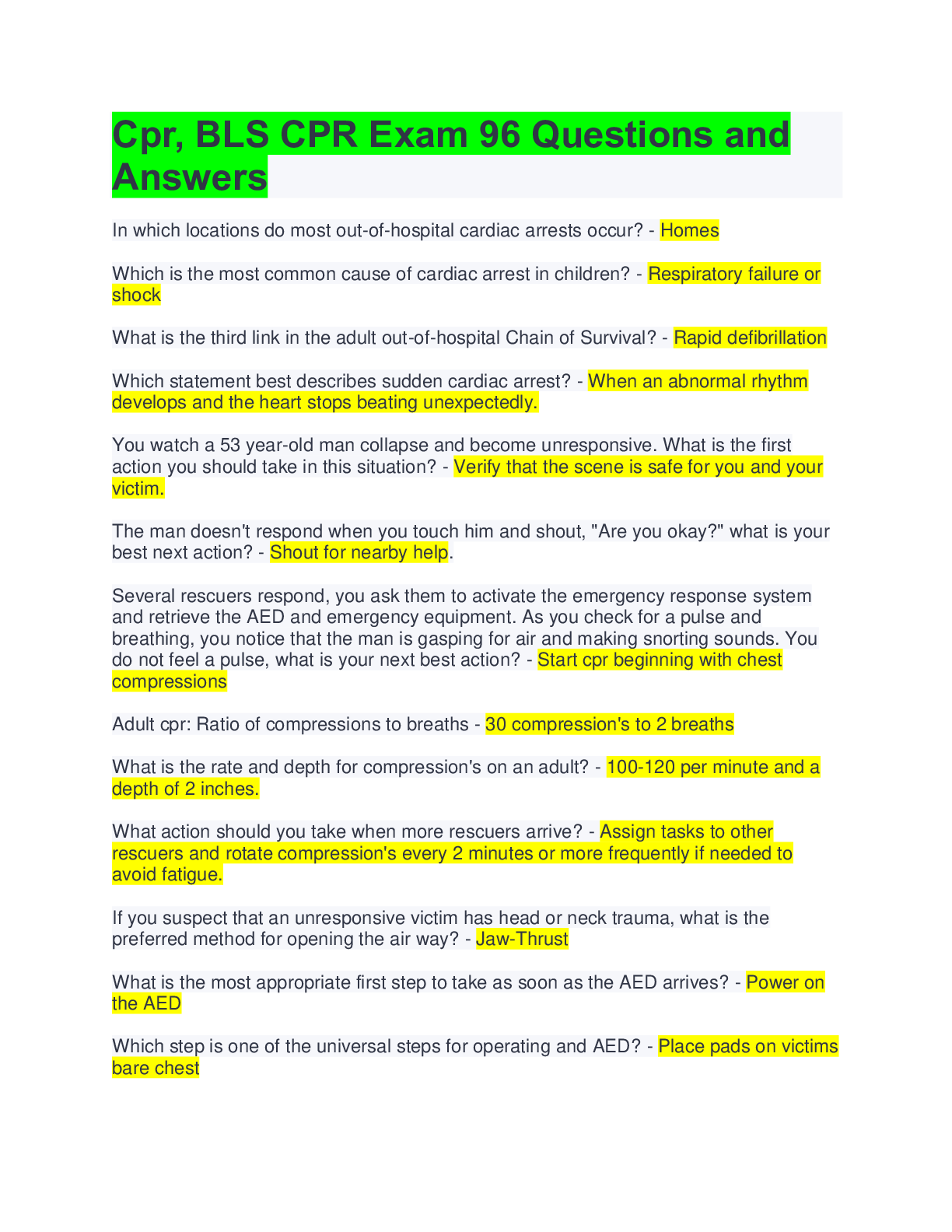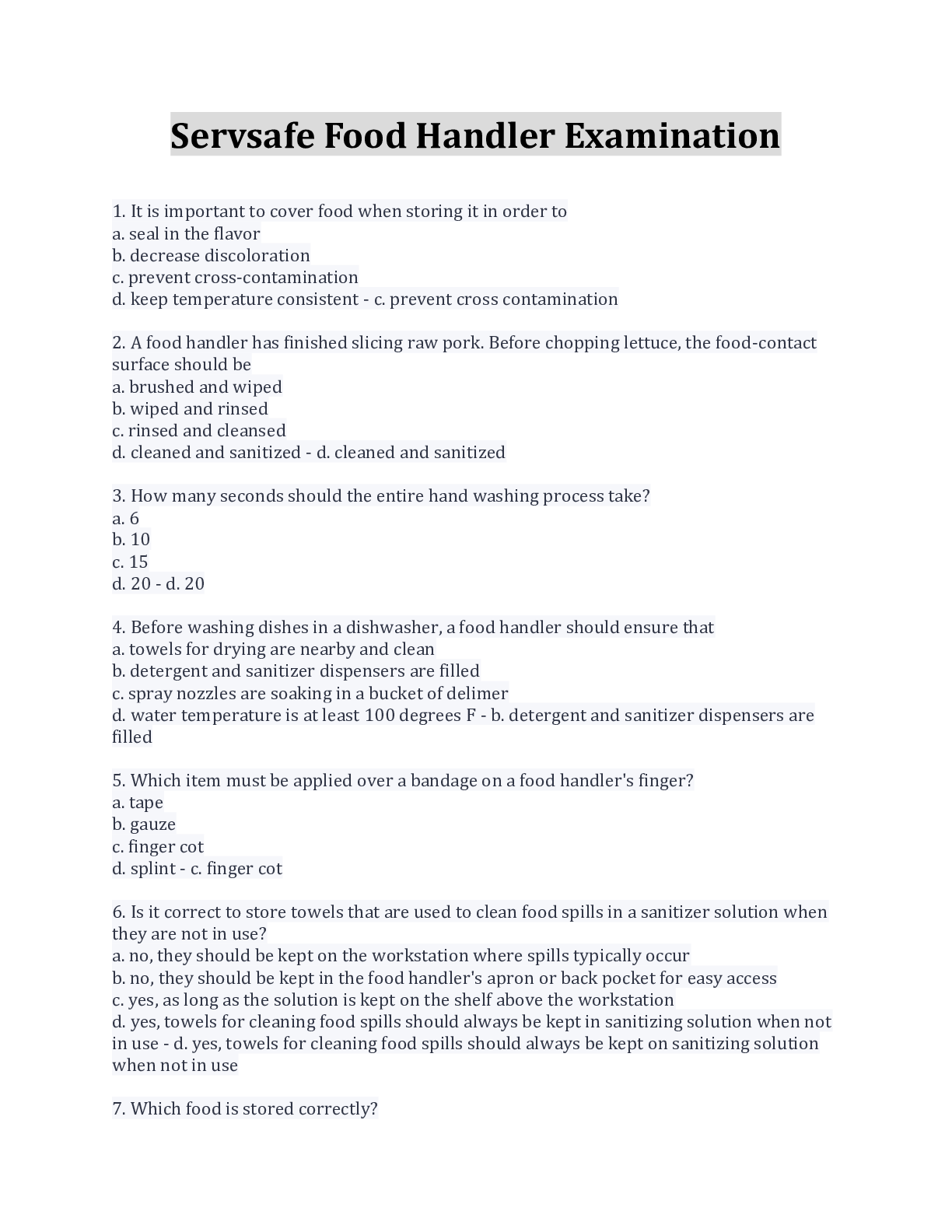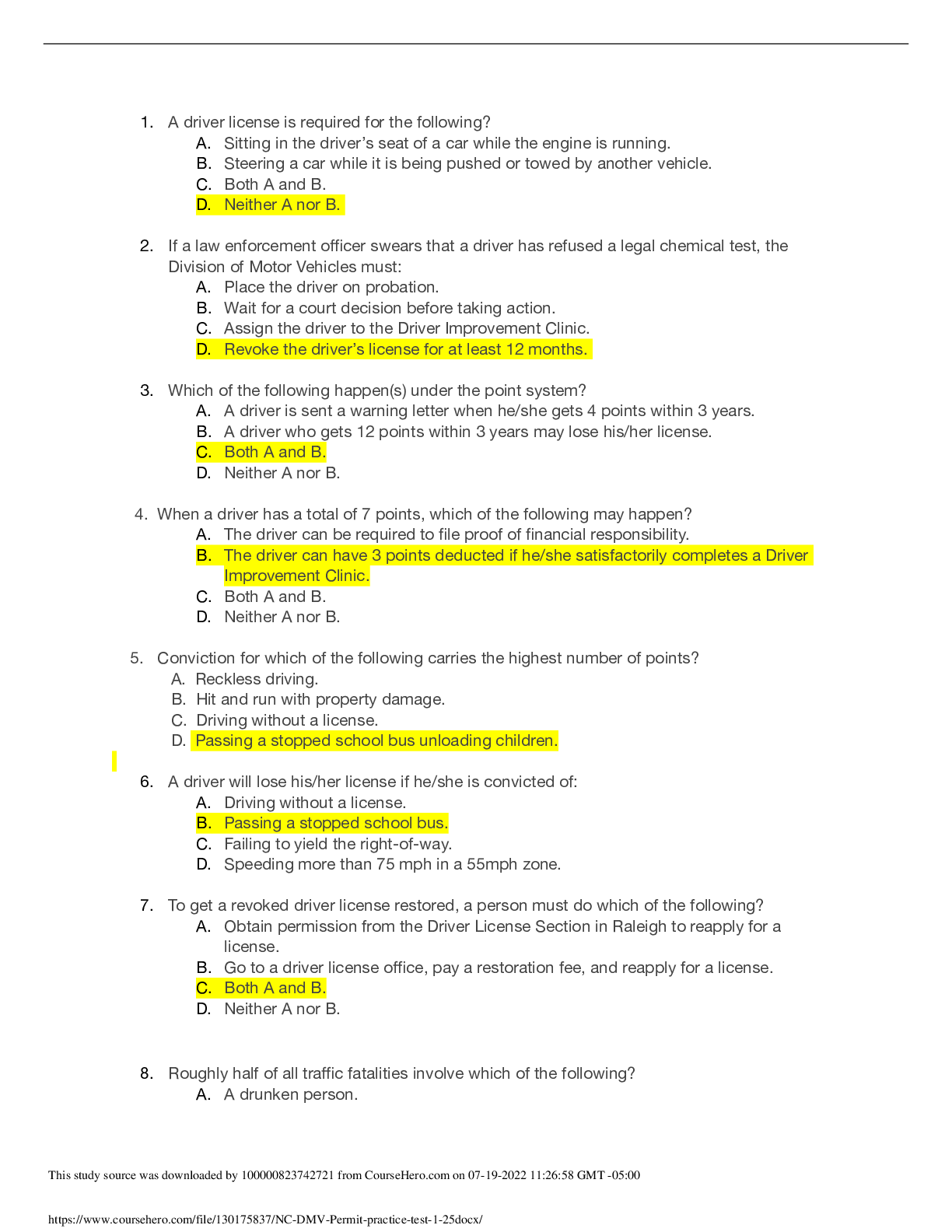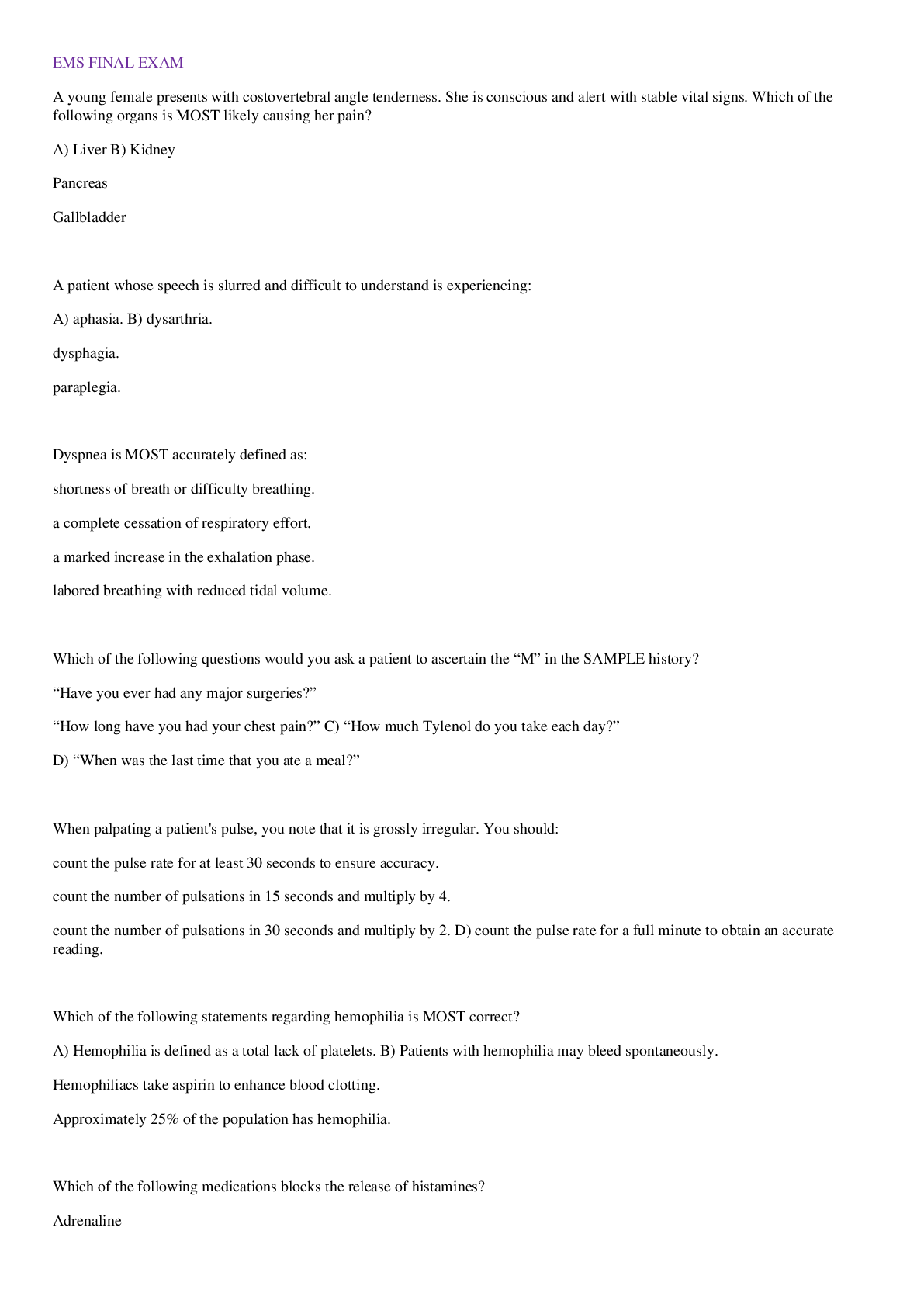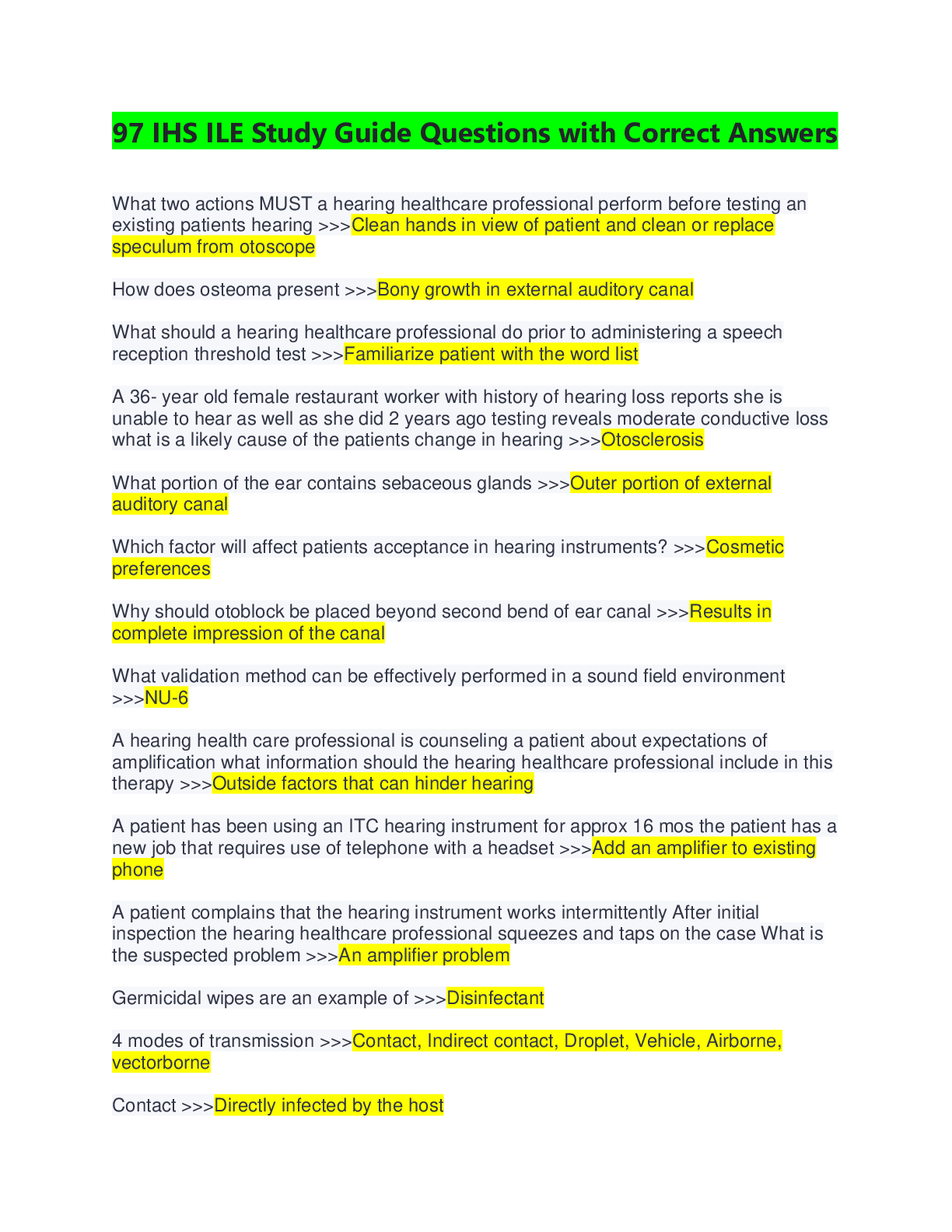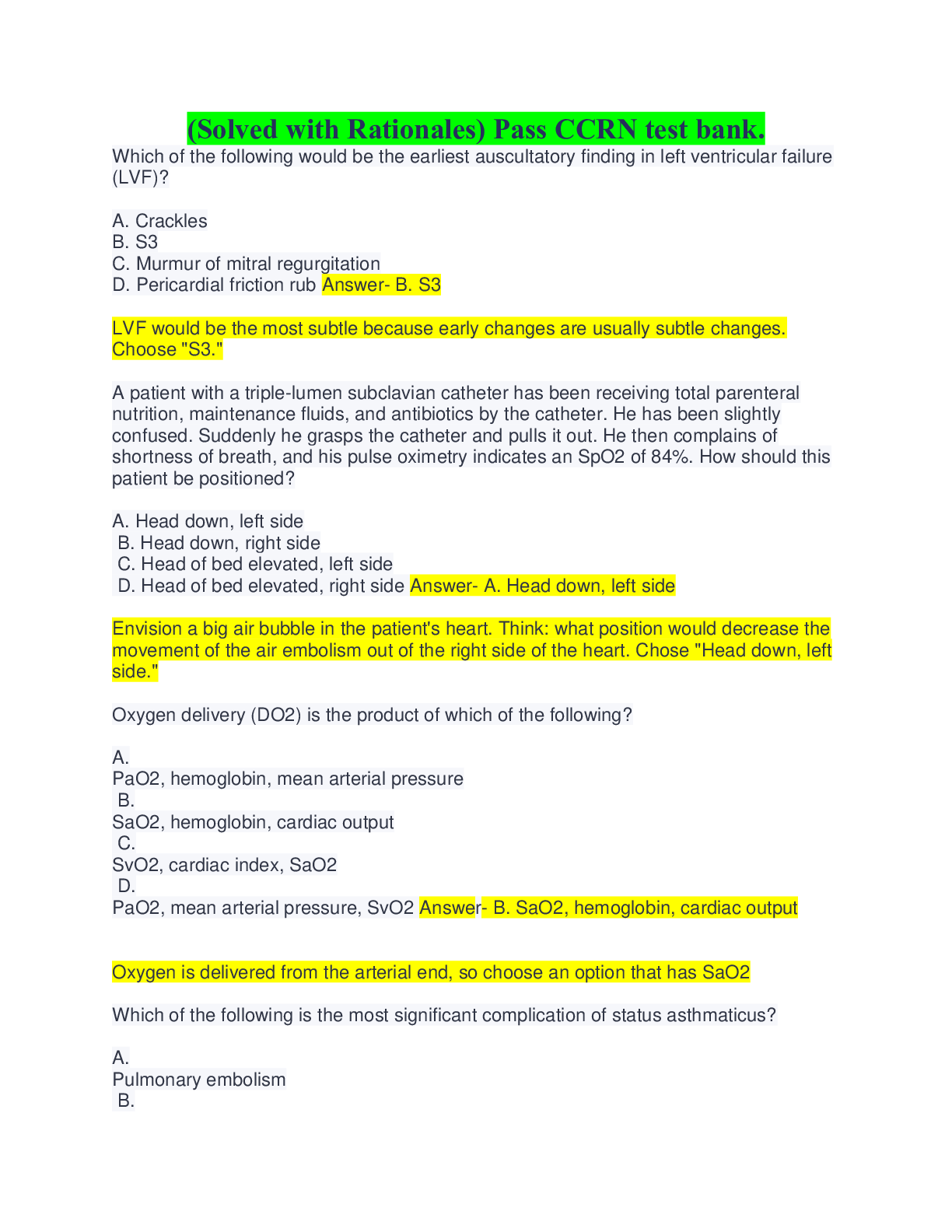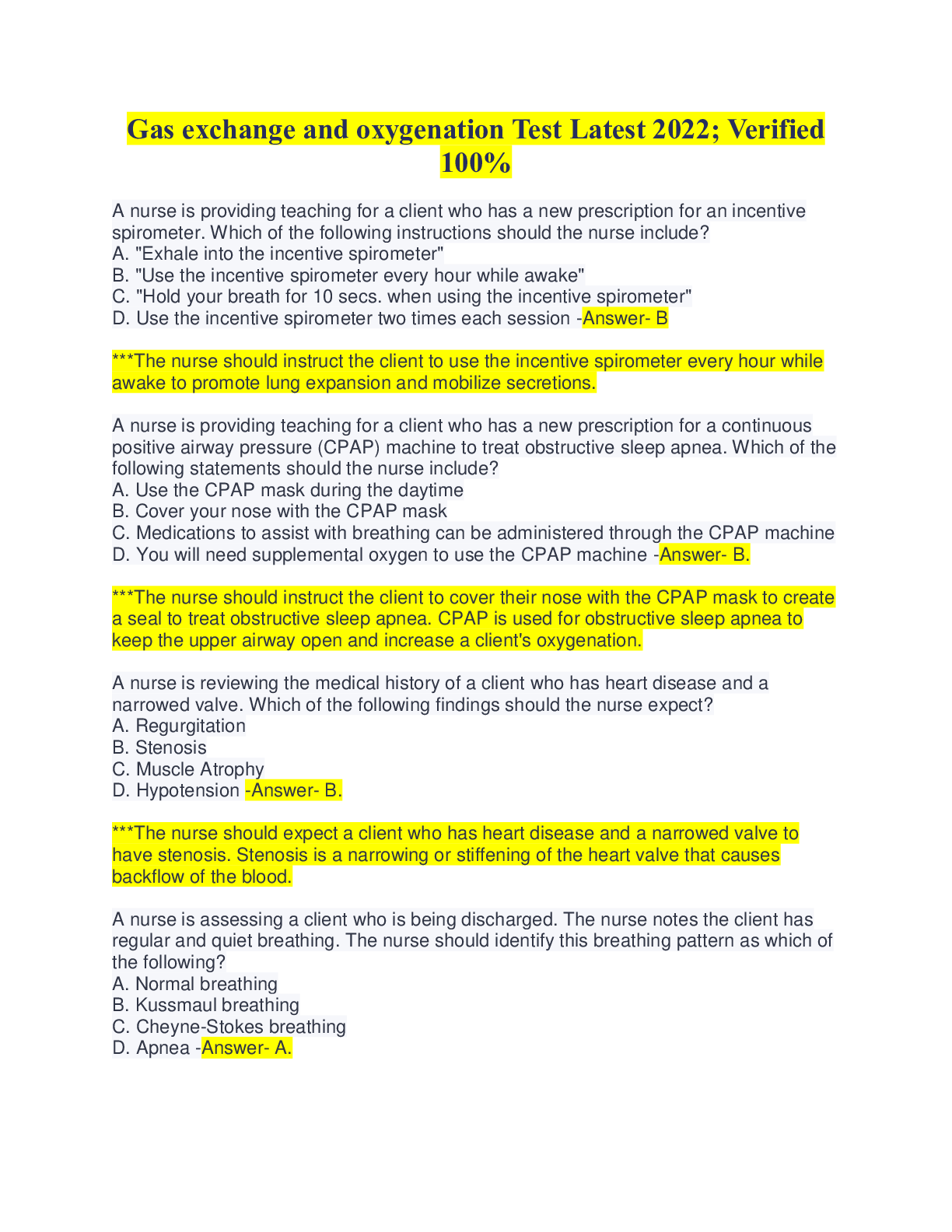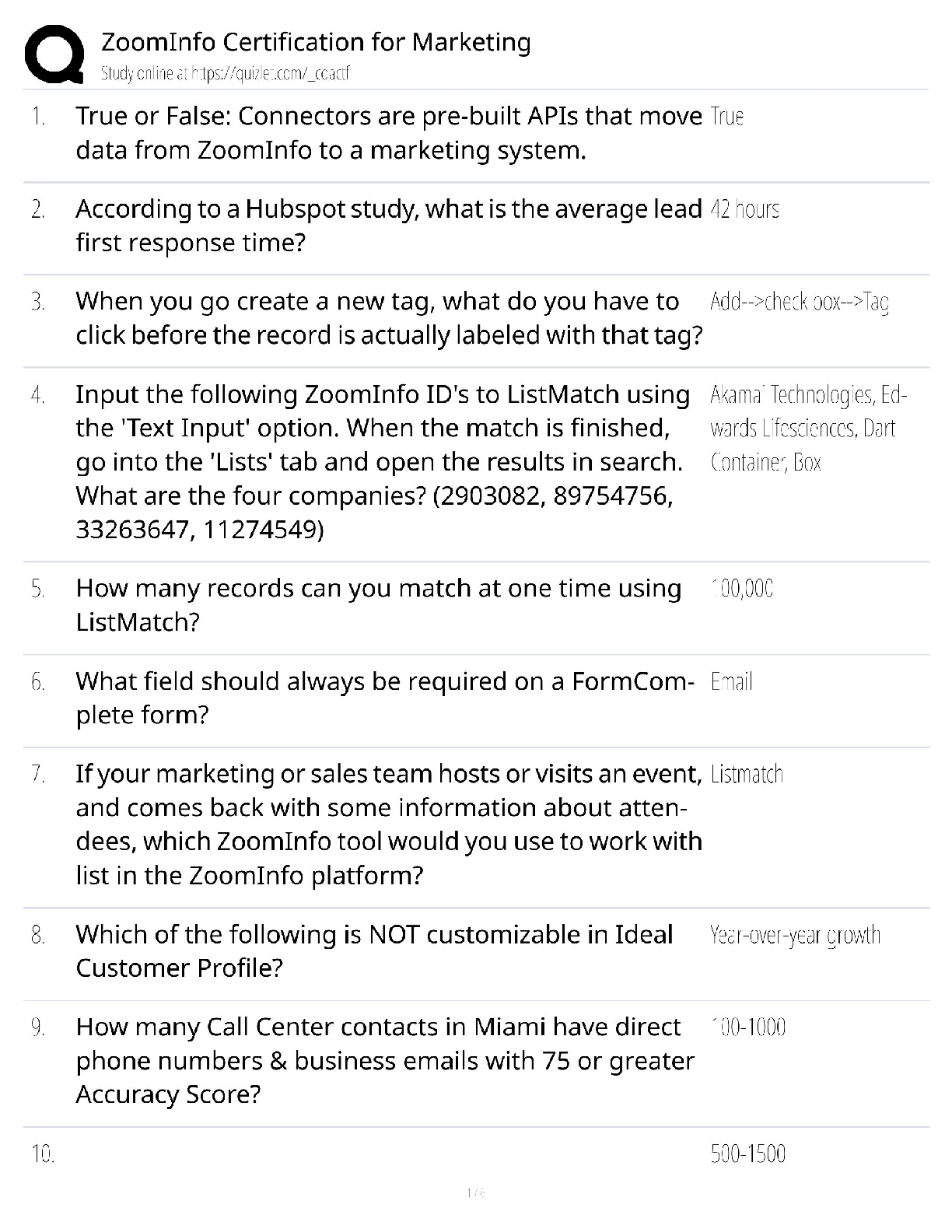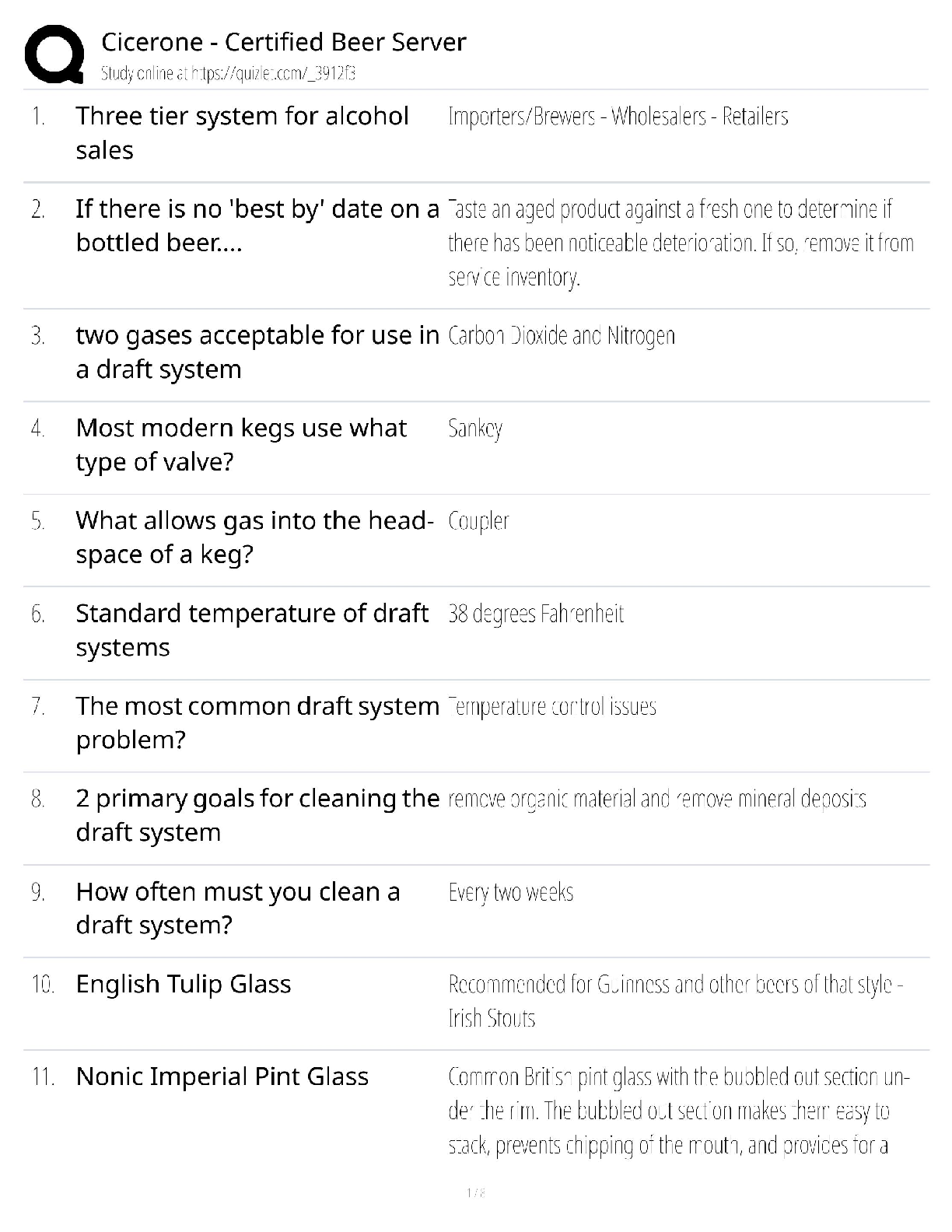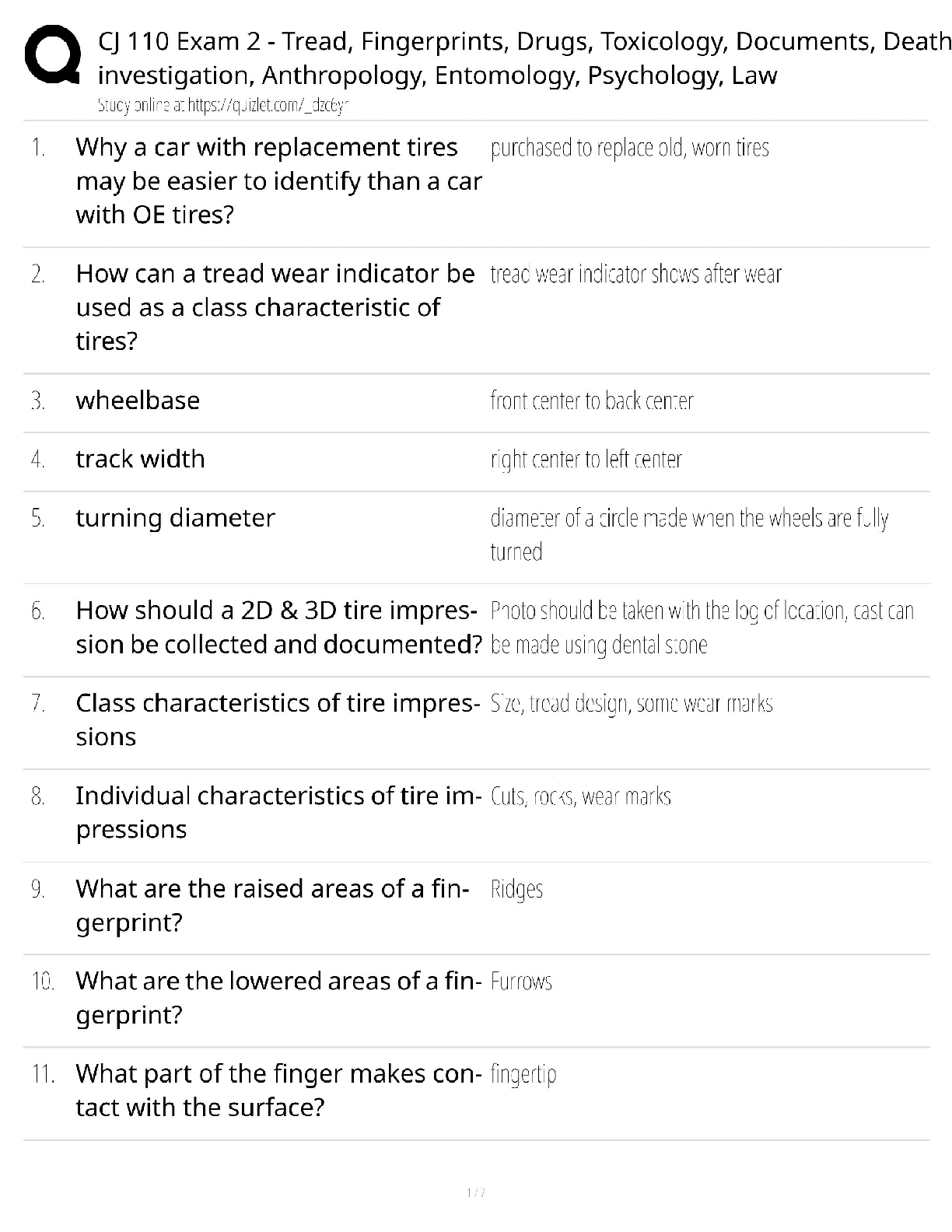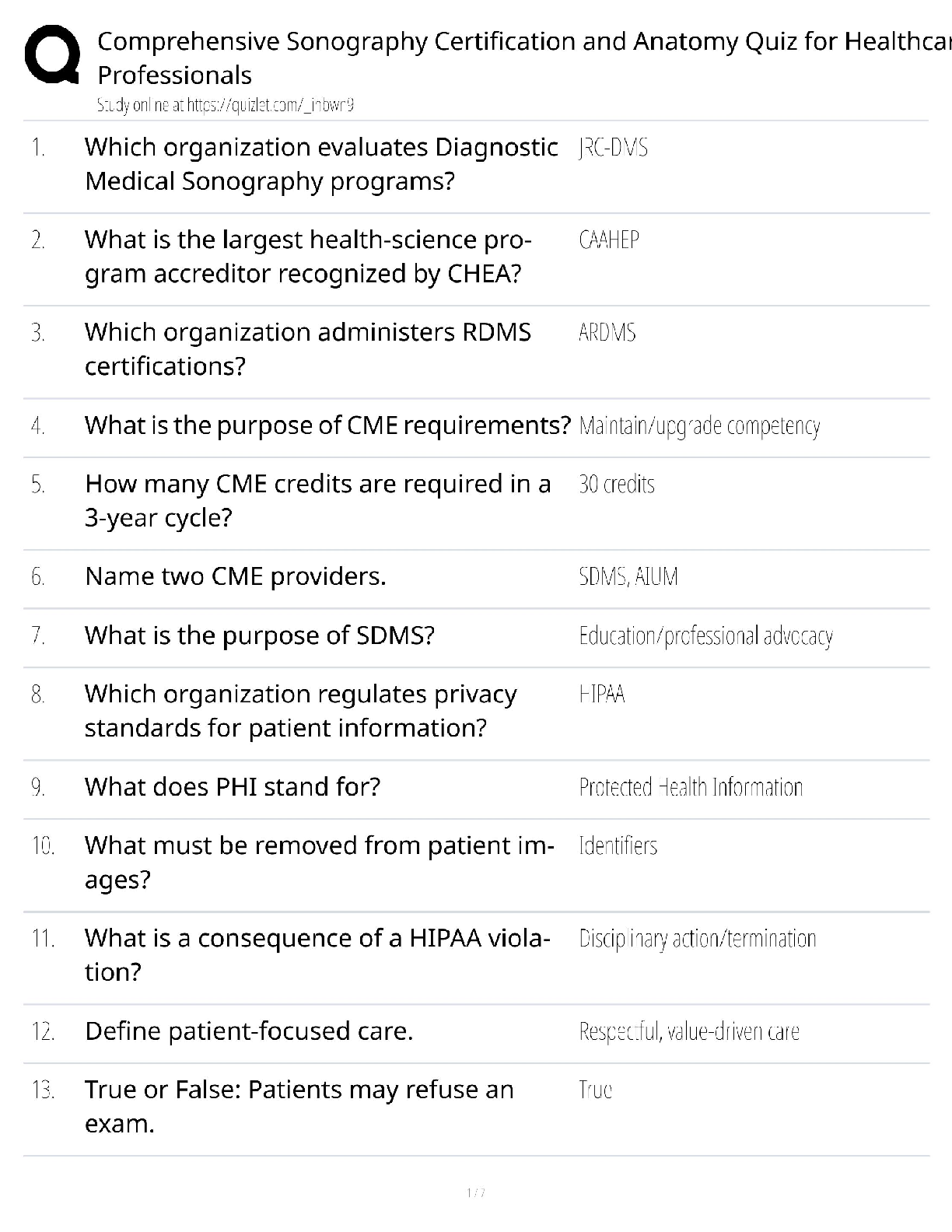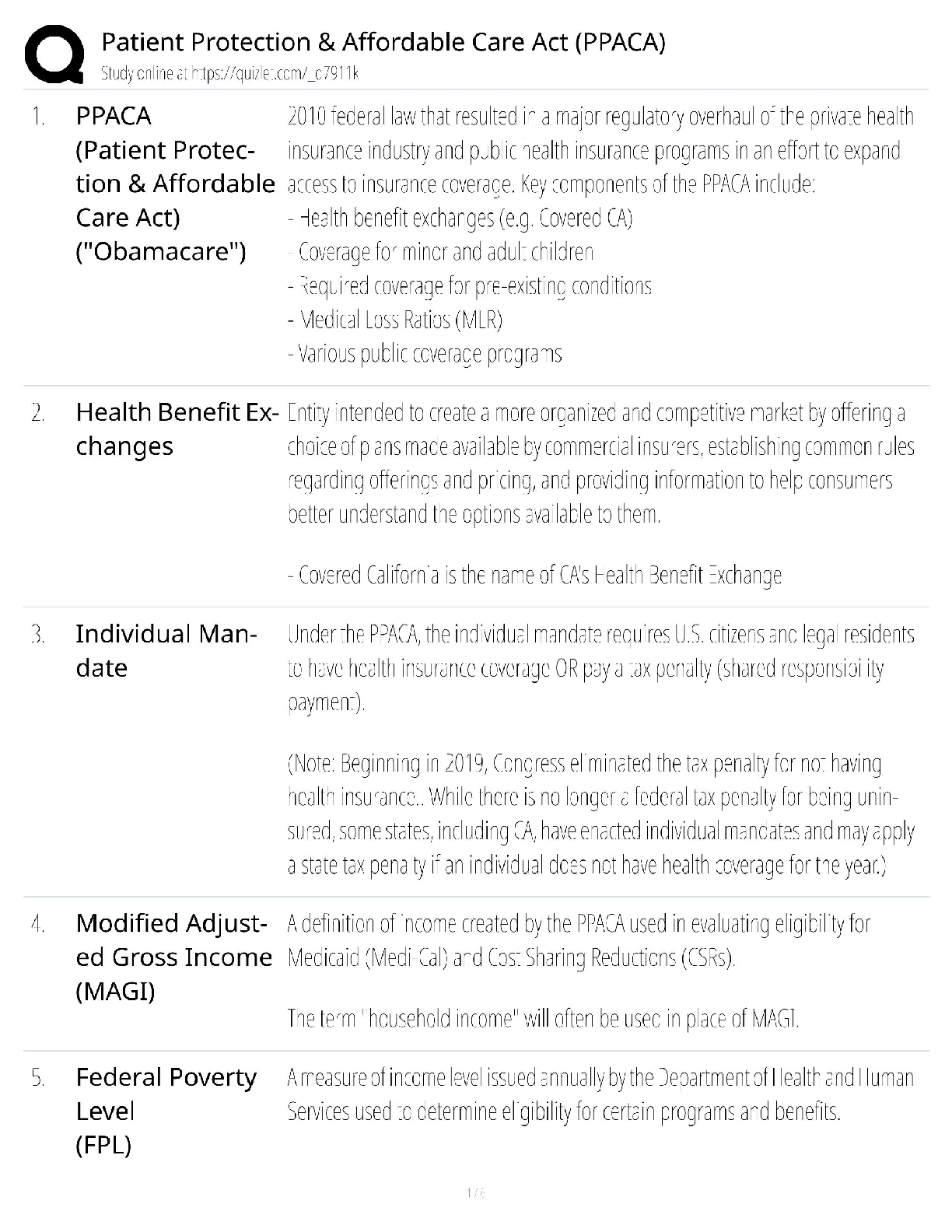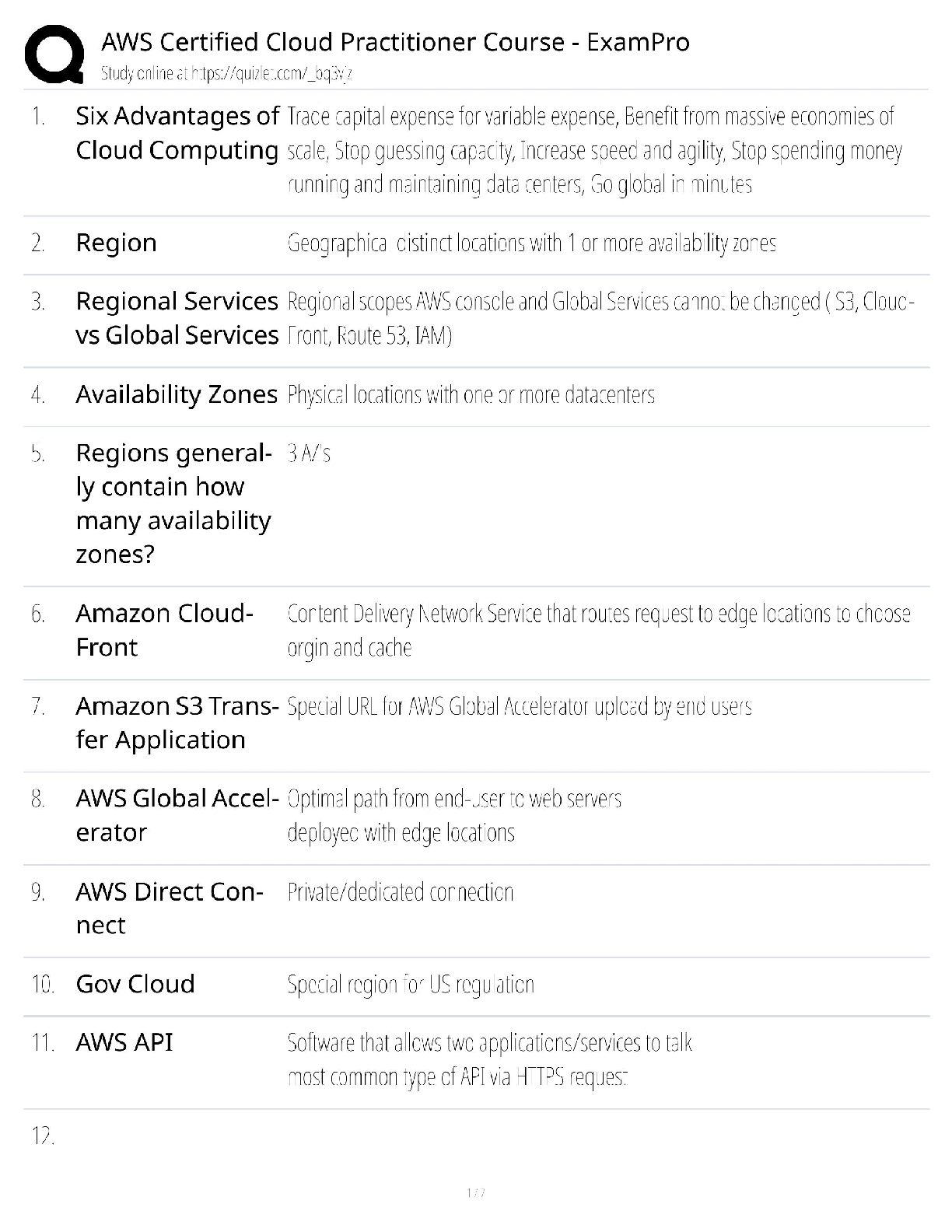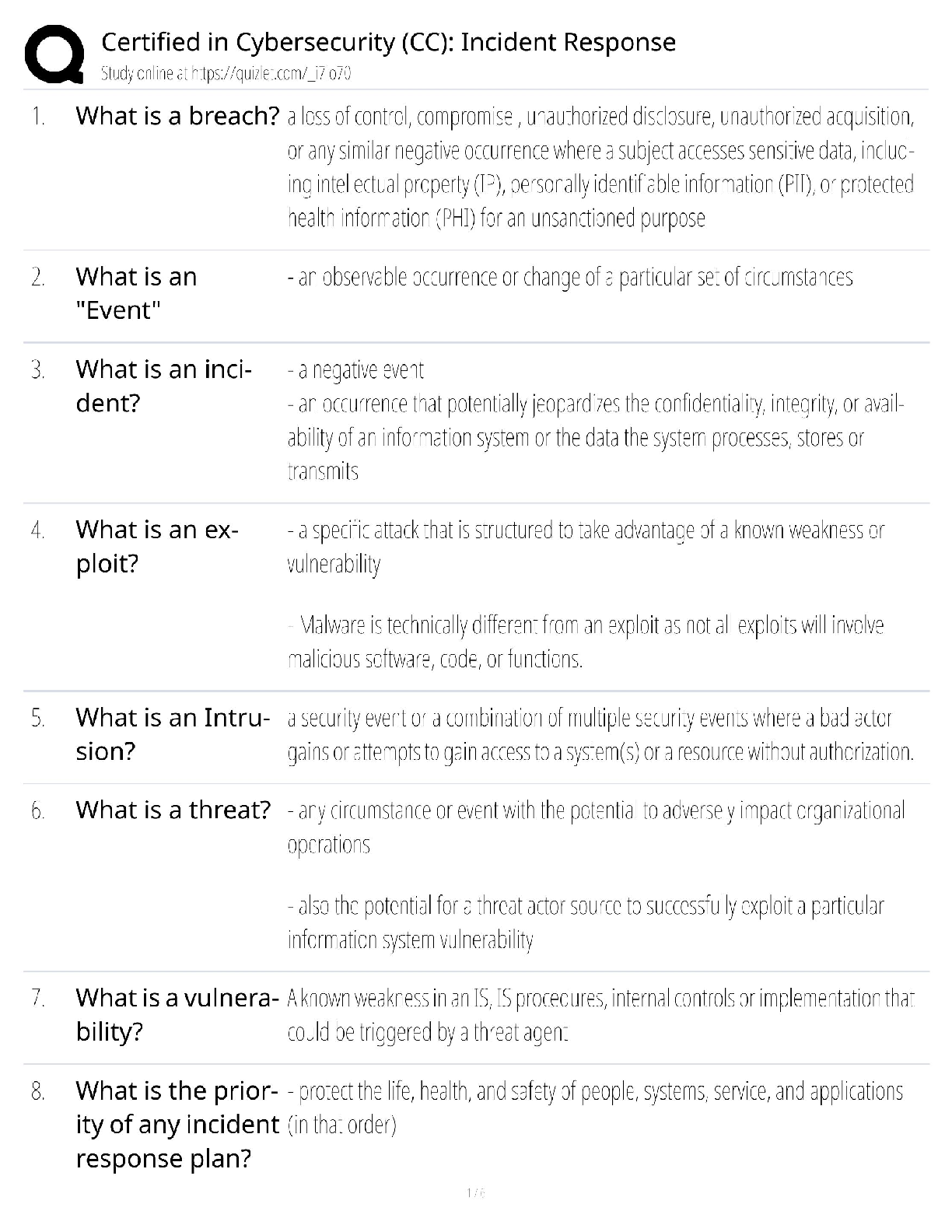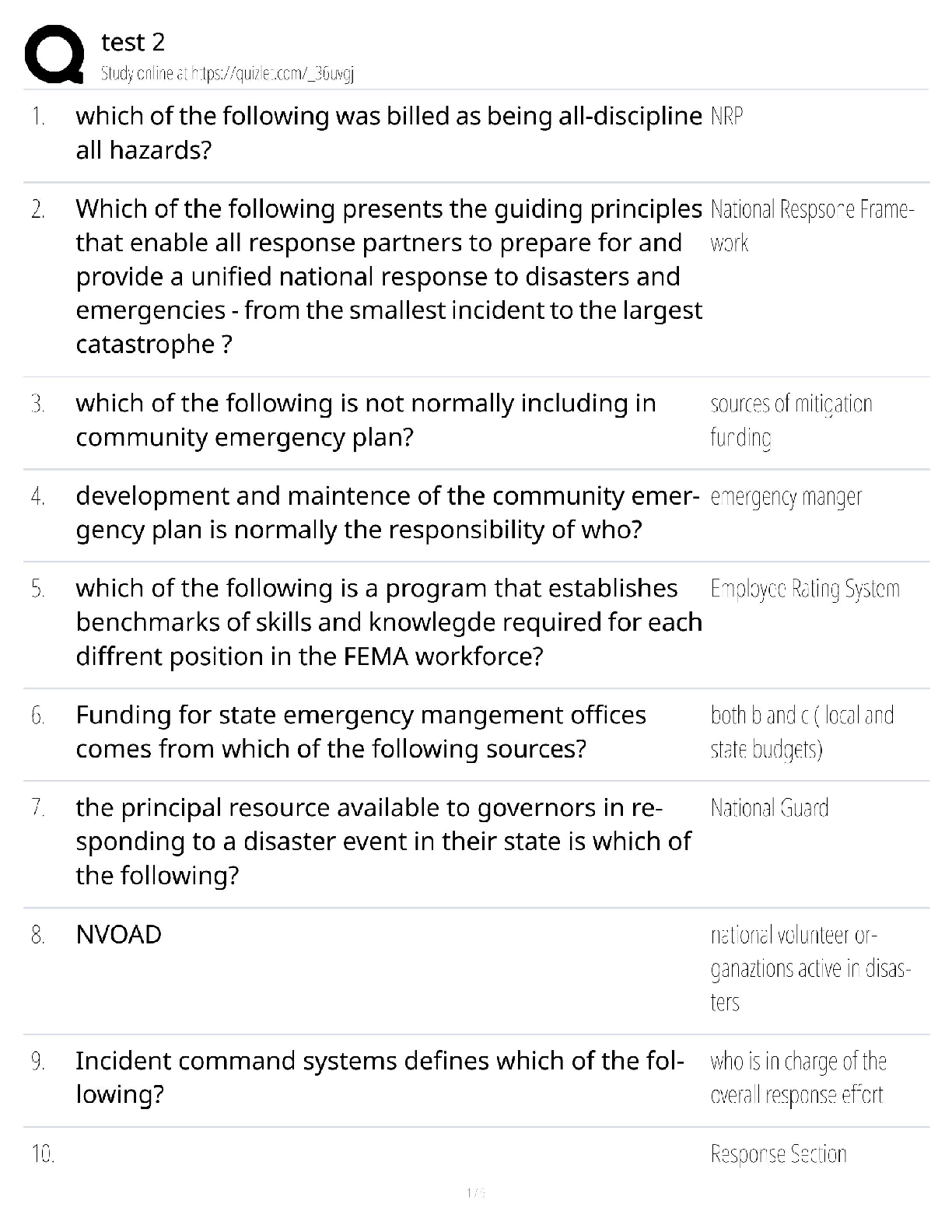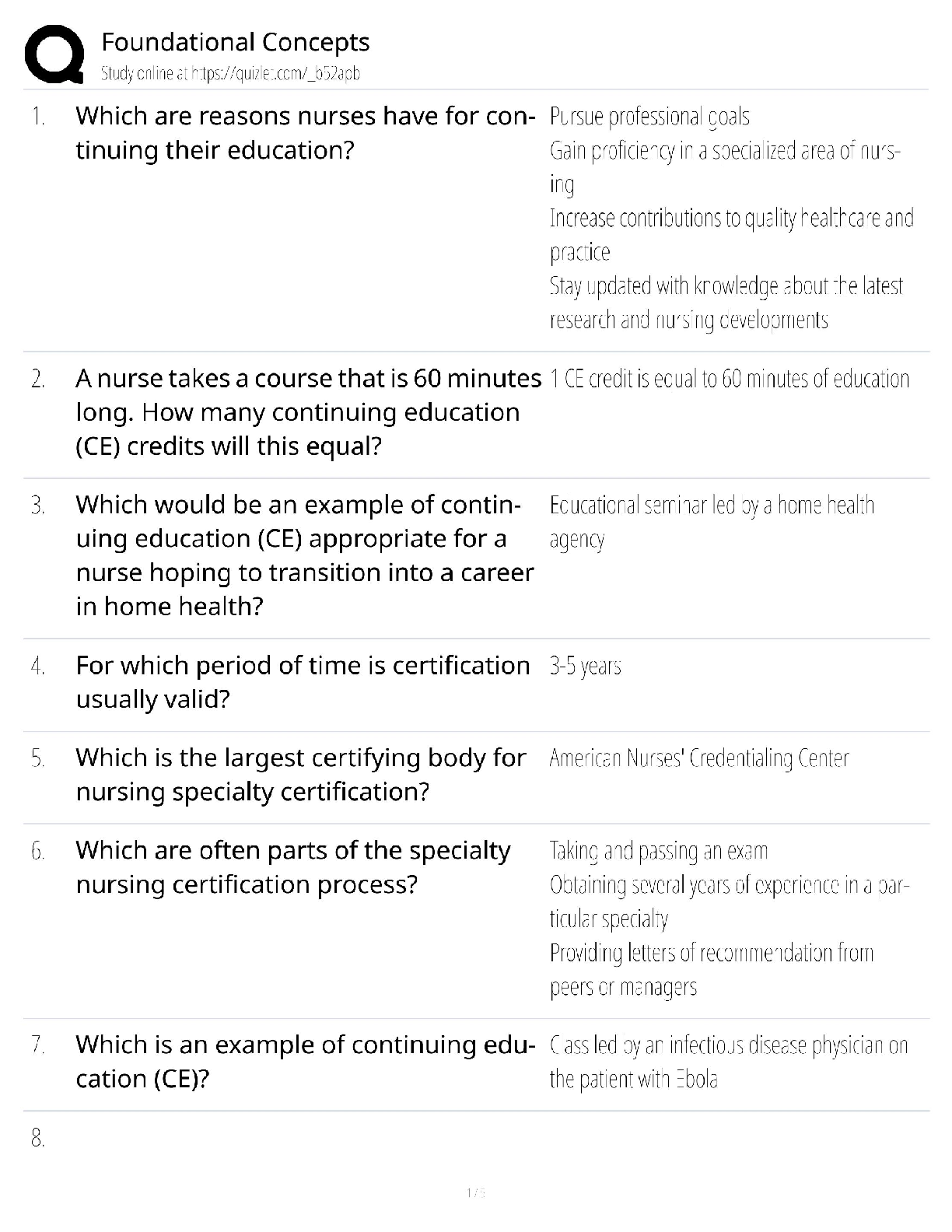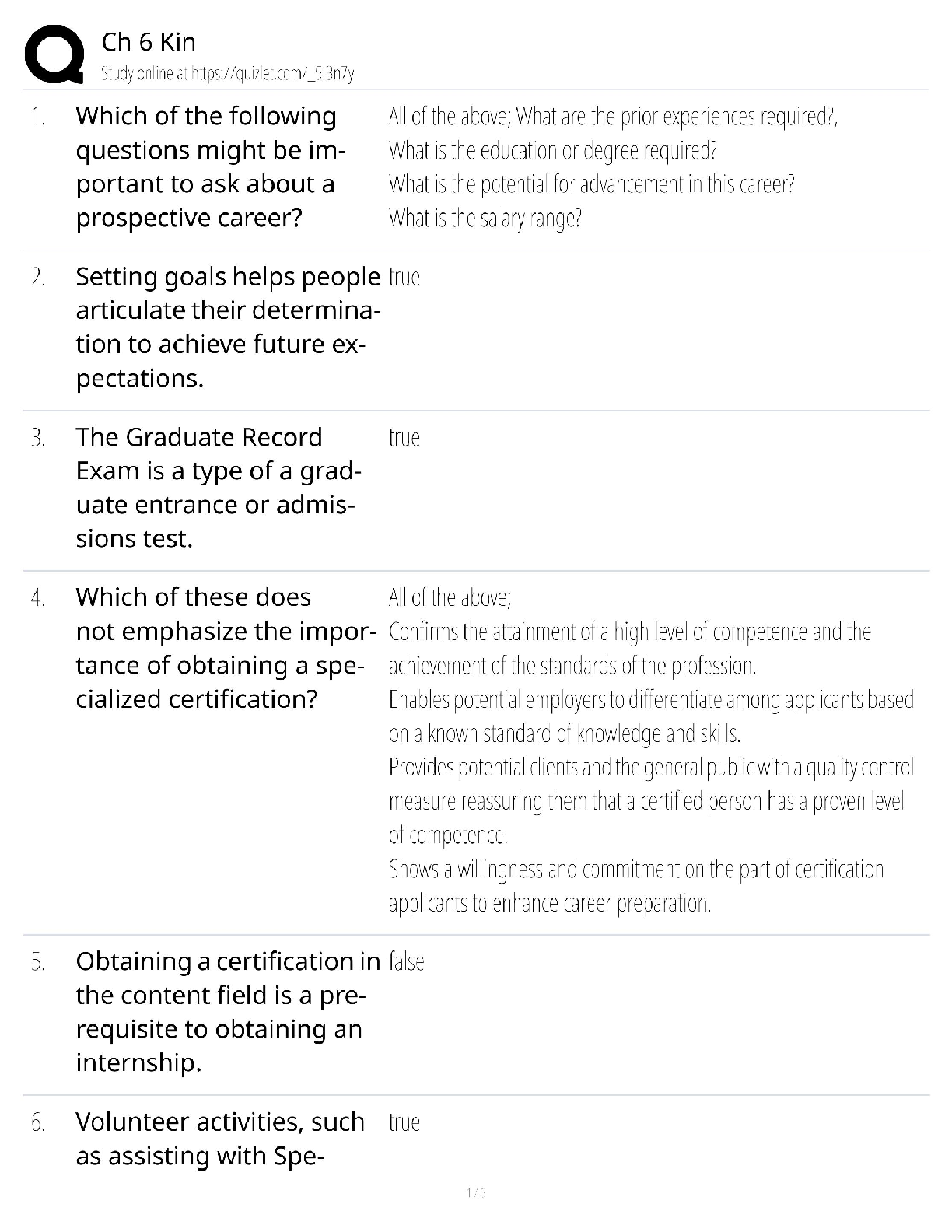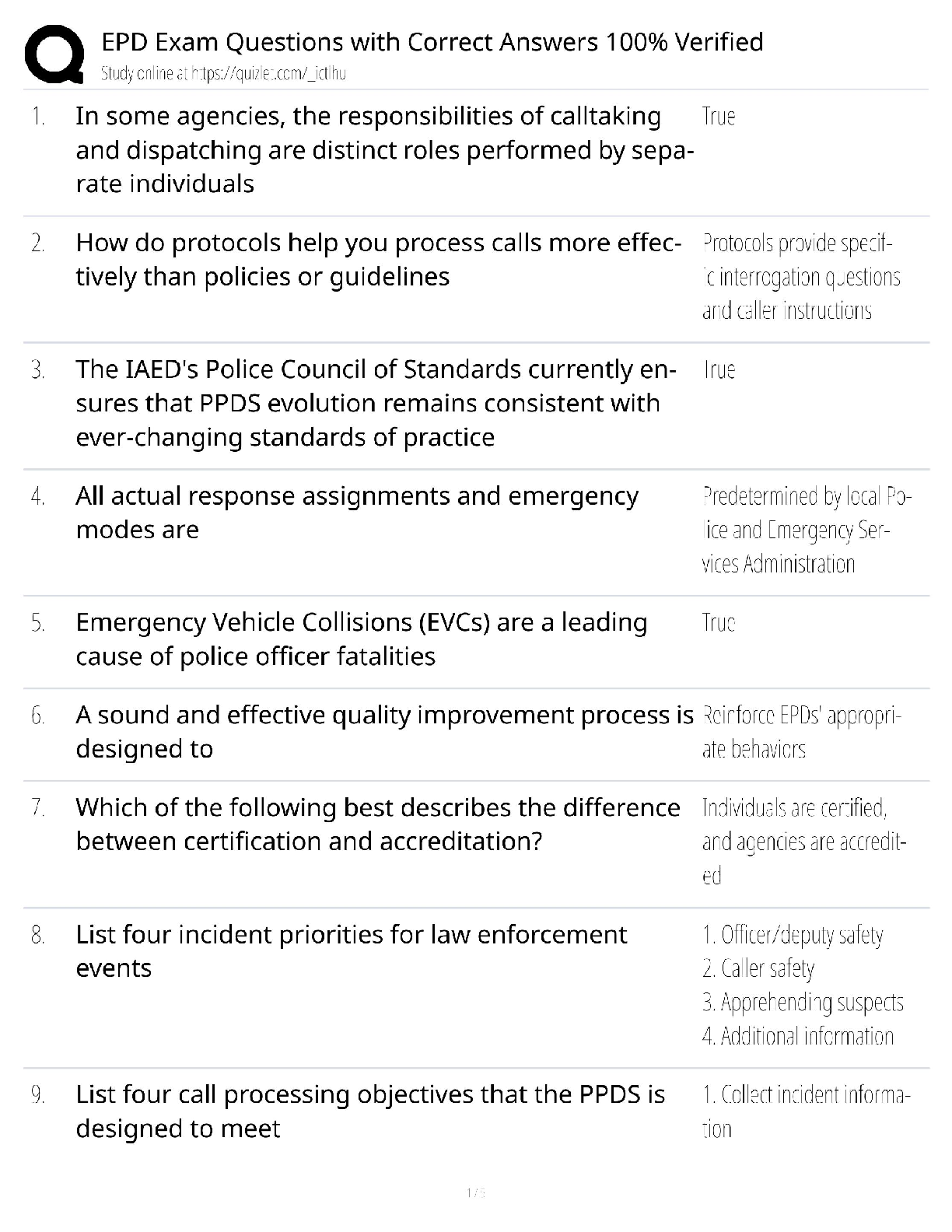Health Care > QUESTIONS & ANSWERS > AHIP 2021, Questions and answers. 100% Accurate. Graded A+ (All)
AHIP 2021, Questions and answers. 100% Accurate. Graded A+
Document Content and Description Below
AHIP 2021, Questions and answers. 100% Accurate. Graded A+ Mr. Xi will soon turn age 65 and has come to you for advice as to what services are provided under Original Medicare. What should you tell ... Mr. Xi that best describes the health coverage provided to Medicare beneficiaries? a. Medicare Part B generally provides prescription drug coverage. b. Beneficiaries under Original Medicare have no cost-sharing for most preventive services which include immunizations such as annual flu shots. c. Medicare Part A generally covers medically necessary physician and other health care professional services. d. Benefits covered by Medicare Parts A and B include routine dental care, hearing aids, and routine eye care. - ✔✔b. Beneficiaries under Original Medicare have no cost-sharing for most preventive services which include immunizations such as annual flu shots. (Beneficiaries enrolled in both Original Medicare (Parts A and B) have no cost-sharing for most preventive services. These services include immunizations such as annual flu shots.) Mr. Singh would like drug coverage but does not want to be enrolled in a Medicare Advantage plan. What should you tell him? a. Mr. Singh must leave Original Medicare to receive drug coverage. b. Part D prescription drug coverage can only be obtained by enrollment into a Medicare Advantage plan that also covers Part A and Part B services. c. Mr. Singh will have to enroll in Medicaid if he wishes to obtain prescription drug coverage through some means other than a Medicare Advantage plan. d. Mr. Singh can enroll in a stand-alone prescription drug plan and continue to be covered for Part A and Part B services through Original Fee-for-Service Medicare. - ✔✔d. Mr. Singh can enroll in a stand-alone prescription drug plan and continue to be covered for Part A and Part B services through Original Feefor-Service Medicare.(Prescription drug coverage is available to those who enroll in a stand-alone Part D prescription drug plan and continue coverage under Original Medicare Part A and Part B.) Mrs. Paterson is concerned about the deductibles and co-payments associated with Original Medicare. What can you tell her about Medigap as an option to address this concern? a. Medigap plans help beneficiaries cover coinsurance, co-payments, and/or deductibles for medically necessary services. b. Medigap plans are not sold by private companies and are a government insurance product. c. All costs not covered by Medicare are covered by some Medigap plans. d. If Mrs. Paterson applies during the Medigap open enrollment period, she will have to undergo a medical review to determine if she has a pre-existing condition that would increase the premium for a Medigap policy. - ✔✔a. Medigap plans help beneficiaries cover coinsurance, co-payments, and/or deductibles for medically necessary services. (Medigap plans help beneficiaries cover coinsurance, co-payments, and/or deductibles when Original Medicare determines that a benefit is medically necessary.) Mr. Diaz continued working with his company and was insured under his employer's group plan until he reached age 68. He has heard that there is a premium penalty for those who did not sign up for Part B when first eligible and wants to know how much he will have to pay. What should you tell him? a. The penalty will be a permanent 10% increase in his Part B premium for every 12-month period that passed during which he could have enrolled and did not. b. Mr. Diaz will pay a penalty, which will be a flat amount each year, paid during the first month of coverage. c. During the first year, he is covered under Part B, his premiums will be 10% higher than they otherwise would be, after which point they will return to normal. d. Mr. Diaz will not pay any penalty because he had continuous coverage under his employer's plan. - ✔✔d. Mr. Diaz will not pay any penalty because he had continuous coverage under his employer's plan. (Individuals with coverage based on their own current employment are not subject to the late enrollment penalty.)Ms. Moore plans to retire when she turns 65 in a few months. She is in excellent health and will have considerable income when she retires. She is concerned that her income will make it impossible for her to qualify for Medicare. What could you tell her to address her concern? a. Medicare is a program for people age 65 or older and those under age 65 with certain disabilities, end-stage renal disease, and Lou Gehrig's disease so she will be eligible for Medicare. b. Eligibility for Medicare is based on whether or not a person has ever been employed by the federal government. If she or her husband were ever employed by the federal government, she can enroll in Medicare. c. Medicare is a program for people who have incomes and assets below specific limits, so you will have to find out her exact financial situation before telling her whether she can obtain Medicare coverage. d. Medicare is a program for people of all ages with specific mental health disabilities. Since she is in excellent health, she would not qualify, but should instead look into her state's Medicaid program if she wants further coverage. - ✔✔a. Medicare is a program for people age 65 or older and those under age 65 with certain disabilities, end-stage renal disease, and Lou Gehrig's disease so she will be eligible for Medicare. (Individuals that meet these criteria may be eligible to participate in Medicare. It is not based on income.) Madeline Martinez was widowed several years ago. Her husband worked for many years and contributed into the Medicare system. He also left a substantial estate which provides Madeline with an annual income of approximately $130,000. Madeline, who has only worked part-time for the last three years, will soon turn age 65 and hopes to enroll in Original Medicare. She comes to you for advice. What should you tell her? a. You should tell Madeline that she will be able to enroll in Medicare Part A without paying monthly premiums due to her husband's long work record and participation in the Medicare system. You should also tell Madeline that she will pay Part B premiums at the highest rate because her income over the last several years has exceeded $100,000. b. You should tell Madeline that she will need to pay premiums for Part A because of her short work history. You should also tell Madeline that she will pay Part B premiums at the highest rate because her income over the last several years has exceeded $100,000. c. You should tell Madeline that she will be able to enroll in Medicare Part A without paying monthly premiums due to her husband's long work record and participation in the Medicare system. You should also tell Madeline that she will pay Part B premiums at more than the standard lowest rate but less than the highest rate due her substantial income.d. You should tell Madeline that she will be able to enroll in both Medicare Part A and Part B without paying monthly premiums due to her husband's long work record and participation in the Medicare system. - ✔✔c. You should tell Madeline that she will be able to enroll in Medicare Part A without paying monthly premiums due to her husband's long work record and participation in the Medicare system. You should also tell Madeline that she will pay Part B premiums at more than the standard lowest rate but less than the highest rate due her substantial income. (Madeline will be able to enroll in premium-free Part A due to her husband's work record. She will pay a premium for Part B coverage based on her income level (her income-related monthly adjustment amount [IRMMA]). An income level of $100,00 would mean Mrs. Martinez would pay a premium more than the standard (lowest) amount but not at the highest level which looks at incomes above $500,000 for those filing individual income tax returns.) Mr. Davis is 52 years old and has recently been diagnosed with end-stage renal disease (ESRD) and will soon begin dialysis. He is wondering if he can obtain coverage under Medicare. What should you tell him? a. He may not sign-up for Medicare until he reaches age 62, the date he first becomes eligible for Social Security benefits. b. He may sign-up for Medicare at any time and coverage usually begins immediately. c. He may sign-up for Medicare at any time however coverage usually begins on the fourth month after dialysis treatments start. d. He may sign-up for Medicare at any time however coverage usually begins on the sixth month after dialysis treatments start. - ✔✔c. He may sign-up for Medicare at any time however coverage usually begins on the fourth month after dialysis treatments start. (Medicare coverage for individuals with ESRD typically begins on the fourth month after dialysis treatments start.) Mr. Wu is eligible for Medicare. He has limited financial resources but failed to qualify for the Part D low-income subsidy. Where might he turn for help with his prescription drug costs? a. Mr. Wu may still qualify for help in paying Part D costs through his State Pharmaceutical Assistance Program.b. Mr. Wu may still qualify for help in paying for Part D costs through the Federal Pharmaceutical Assistance Program. c. Mr. Wu may still qualify for help in paying for Part D costs through the local Office of the Aging. d. Mr. Wu has no alternative but to liquidate his remaining assets and apply for coverage through his state's Medicaid program. - ✔✔a. Mr. Wu may still qualify for help in paying Part D costs through his State Pharmaceutical Assistance Program. (A State Pharmaceutical Assistance Program may be able to provide assistance with prescription drug costs for those who are of limited means but do not qualify for the Part D low-income subsidy.) Mr. Moy's wife has a Medicare Advantage plan, but he wants to understand what coverage Medicare Supplemental Insurance provides since his health care needs are different from his wife's needs. What could you tell Mr. Moy? a. Medicare Supplemental Insurance would cover his long-term care services. b. Medicare Supplemental Insurance would cover all of his IRS approved health care expenditures not covered under Original Fee-for-Service (FFS) Medicare. c. Medicare Supplemental Insurance would help cover his Part A and Part B cost sharing in Original Feefor-Service (FFS) Medicare as well as possibly some services that Medicare does not cover. d. Medicare Supplemental Insurance would cover his dental, vision and hearing services only. - ✔✔c. Medicare Supplemental Insurance would help cover his Part A and Part B cost sharing in Original Feefor-Service (FFS) Medicare as well as possibly some services that Medicare does not cover. (Medicare Supplement Insurance (Medigap) helps to cover Part A and Part B cost-sharing in Original Medicare as well as possibly offering some services such as medical care when a beneficiary travels outside the United States.) Mr. Schmidt would like to plan for retirement and has asked you what is covered under Original Fee-forService (FFS) Medicare? What could you tell him? a. Part D, which covers prescription drug services, is covered under Original Medicare. b. Part A, which covers long term custodial care services, is covered under Original Medicare. c. Part C, which always covers dental and vision services, is covered under Original Medicare.d. Part A, which covers hospital, skilled nursing facility, hospice, and home health services and Part B, which covers professional services such as those provided by a doctor are covered under Original Medicare. - ✔✔d. Part A, which covers hospital, skilled nursing facility, hospice, and home health services and Part B, which covers professional services such as those provided by a doctor are covered under Original Medicare. (Original Medicare consists of Part A and Part B.) Mrs. Shields is covered by Original Medicare. She sustained a hip fracture and is being successfully treated for that condition. However, she and her physicians feel that after her lengthy hospital stay she will need a month or two of nursing and rehabilitative care. What should you tell them about Original Medicare's coverage of care in a skilled nursing facility? a. Once she has expended her liquid assets, Medicare will cover 80% of Mrs. Shields long-term care costs. b. Medicare will cover Mrs. Shield's skilled nursing services provided during the first 20 days of her stay, after which she would have a copay until she has been in the facility for 100 days. c. Medicare will cover an unlimited number of days in a skilled-nursing facility, as long as a physician certifies that such care is needed. d. Mrs. Shields will have to apply for Medicaid to have her skilled nursing services covered because Medicare does not provide such a benefit. - ✔✔b. Medicare will cover Mrs. Shield's skilled nursing services provided during the first 20 days of her stay, after which she would have a copay until she has been in the facility for 100 days. [Show More]
Last updated: 3 years ago
Preview 1 out of 53 pages

Buy this document to get the full access instantly
Instant Download Access after purchase
Buy NowInstant download
We Accept:

Also available in bundle (1)
Click Below to Access Bundle(s)

AHIP FULL SOLUTION PACK(ALL AHIP EXAMS AND STUDY QUESTIONS ARE HERE ,ALL ANSWERED CORRECTLY)
AHIP - Final examination Questions with accurate answers, 2022/2023. Rated A AHIP TRAINING MODULE #2, Questions with accurate answers. 2022 version. Graded A+ AHIP TRAINING Module 1 Questions wi...
By Professor Lynne 3 years ago
$15
26
Reviews( 0 )
$11.00
Can't find what you want? Try our AI powered Search
Document information
Connected school, study & course
About the document
Uploaded On
Sep 19, 2022
Number of pages
53
Written in
All
Additional information
This document has been written for:
Uploaded
Sep 19, 2022
Downloads
0
Views
250

